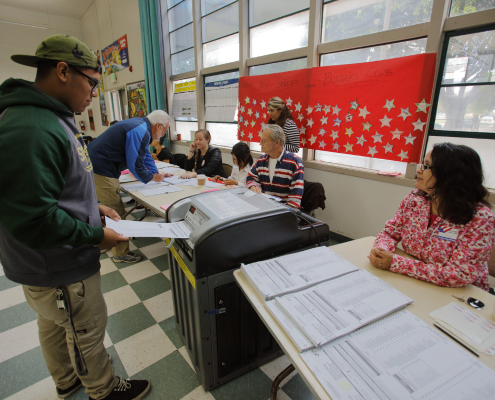Democracy
A more just and inclusive democracy is imperative to achieve equity for all Californians.


Why Democracy matters for racial equity:
A more participatory and representative government is the bedrock for achieving a more racially and economically just California. However, despite being a majority-minority state since 2000, California’s democracy does not reflect its demographic reality. Significant racial disparities persist in voting and other forms of political participation, such as contacting officials and donating to campaigns. Similarly, racial gaps persist in who is elected to public office. In both cases, Whites, especially those who are more affluent, tend to be overrepresented, whereas people of color, especially those who are less affluent, tend to be underrepresented. It is imperative, now more than ever, that governments improve their ability to engage with a wider range of community residents and be more responsive to the diverse needs and interests of our growing populations.

What we find:
The Democracy issue area showcases a significant growth in both political participation and power amongst Latinx, American Indian / Alaska Native (AIAN), Black, and Asian Californians compared to Whites. However, more progress is needed. For example, the data showcases that people of color are less likely to be registered voters and vote and are less likely to be represented in government by elected officials from their race or ethnicity. In the future, we will likely see that, despite challenges posed by the pandemic, political participation will increase because of multiple factors, including statewide adoption of vote-by-mail, automatic voter registration when receiving a driver’s license and early voting.
Key Takeaways.
Democracy
Learn More about our Methodology
Policy levers:
Community leaders in California are currently building a new electorate, pushing for policies that empower and shift resources to low-income communities of color and build political power. An important step in improving outcomes on this issue area is improving the availability of data. For instance, the indicators available to us primarily focus on voting, meaning that we have an incomplete picture of disparities in other forms of political participation. Insufficient data limit our understanding of democracy outcomes for AIAN, Native Hawaiian/Pacific Islander and other less populous groups. Another way we can improve is by increasing political engagement among underrepresented populations in voting and other areas, such as through participatory budgeting. Lastly, local governments, particularly those in areas with large numbers of people of color, should create offices of equity that oversee how well or poorly the local jurisdiction is doing on ensuring equity and develop policies to advance equity within its boundaries.
Put Data to Use
Learn how you can take action to eliminate racial disparity and use RACE COUNTS data to advance social justice.
Take Action